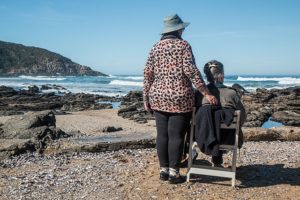 Nurturing compassion, connection, and empathy between ourselves and others can be as simple as affirming the phrase ‘just like me’ where we might otherwise judge, criticize or condemn. This compassion practice invites us to put ourselves into another’s shoes by concretely acknowledging our own likeness to our neighbour, to a stranger, to our family member or friend with whom we are in conflict or are triggered to criticize and hate.
Nurturing compassion, connection, and empathy between ourselves and others can be as simple as affirming the phrase ‘just like me’ where we might otherwise judge, criticize or condemn. This compassion practice invites us to put ourselves into another’s shoes by concretely acknowledging our own likeness to our neighbour, to a stranger, to our family member or friend with whom we are in conflict or are triggered to criticize and hate.
I personally use this compassion practice in my work when at times I have no answer for a client experiencing the angst of loss or even, the fear of their potential unrealized. As I listen, I quietly tell myself, ‘just like me’, they feel ashamed that they have found themselves in this conflict, in this depression, in this place of career deficit.
‘Just like me’ calls me to love, to have compassion for the frailties and suffering we experience as humans. Regardless of background, we all are touched by the fires and waters of the human condition. No one here has been rescued from the pains of birth, nor will anyone escape the path of death. ‘Just like me’ calls me to honour the equality of our humanity regardless of race, sex, class, age, etc.
 Today, I received an email from a client asking for guidance for a relationship situation causing them distress. At the core of this relationship stress, lies the client’s fear and life pattern of being unworthy, not good enough, of finding themselves painfully wrong in their mind. When shame strikes us, it usually cuts into our core sense of self-respect. As I read this email, I found myself saying, ‘just like me’, this client is feeling the oppression of the past. ‘Just like me’, this client is feeling the weight of resentment not yet transformed. ‘Just like me’, this client is searching for the freedom to be healthy and happy in their current life.
Today, I received an email from a client asking for guidance for a relationship situation causing them distress. At the core of this relationship stress, lies the client’s fear and life pattern of being unworthy, not good enough, of finding themselves painfully wrong in their mind. When shame strikes us, it usually cuts into our core sense of self-respect. As I read this email, I found myself saying, ‘just like me’, this client is feeling the oppression of the past. ‘Just like me’, this client is feeling the weight of resentment not yet transformed. ‘Just like me’, this client is searching for the freedom to be healthy and happy in their current life.
Honouring our ‘sameness’ in this way, opens space for me to listen and hear what may not be said, what pain may not be expressed and yet is eerily present in its absence. As a response, ‘just like me’ gives me enough space between my thoughts that I can reach into my heart and find the compassion to neutralize the judgements or criticisms that might be beginning to ride my neuro-pathways. This pause also invites me to remind myself of my practice of loving-kindness, to love all of who I am, to welcome the truth of my being to the inner table of Self. When I return to love in me, I return to love for the ‘other’.
When we consider life in a wholistic way, then a spiritual practice becomes multi-purpose, three fields of experience unified as one.
First, ‘Just like me’ becomes a practice that not only evokes the spark of compassion in our shared humanity when life is painful, sorrowful or even where there is anger and hurt.
 Second, ‘just like me’ becomes the practice of seeing the empowered and dignified essence of the other. ‘Just like me’, my client has the powerful potential to become resourceful and capable to transform their inner experience and change their sense of Self. ‘Just like me’, with a little guidance, my client is loving and compassionate, capable of experiencing a more satisfying life. ‘Just like me’, my client’s inner wisdom holds the inner motivation and life-giving permission to generate new habits and choices that best align with what their heart wants most. ‘Just like me’, my client can ask for the support they need to return to the peace and abundance that belongs to our shared humanity.
Second, ‘just like me’ becomes the practice of seeing the empowered and dignified essence of the other. ‘Just like me’, my client has the powerful potential to become resourceful and capable to transform their inner experience and change their sense of Self. ‘Just like me’, with a little guidance, my client is loving and compassionate, capable of experiencing a more satisfying life. ‘Just like me’, my client’s inner wisdom holds the inner motivation and life-giving permission to generate new habits and choices that best align with what their heart wants most. ‘Just like me’, my client can ask for the support they need to return to the peace and abundance that belongs to our shared humanity.
Finally, ‘just like me’ awakens us to our creativity and collaboration, our light and love to become what neither imagined in the beginning. As clients and I engage in the compassionate way of ‘just like me’ on our shared path of Wisdom’s Way to Peace, wisdom and peace transform both our hearts, trickling out into our families, our workspaces, our environments, or visions for a more peaceful world. We are no longer just night and day. Now we can enjoy the fullness of life as dusk and dawn as well.
‘Just like me’, our shared humanity is best and most joyfully celebrated when we honour that
- we have all grieved the loss of loved ones
- we have all been embarrassed to the core about something we did or didn’t do
- we have all spoken harsh words in our pain
- we have all wept at the suffering of another
- we have all acted in anger when experiencing disrespect and our needs and dreams denied.
And paradoxically, when we honour that
- we all have been born to this Earth
- we all have a song that lives in our heart waiting to be sung
- we all have the potential to be vital and empowered human beings with compassionate hearts
- we all have gifts and talents, some active, some dormant awaiting the opportunity to breathe into them, to nurture them
- we all have the need to be loved, belong and live the authenticity of our uniqueness and our shared humanity
- we all have the capacity to be wise and to benefit from our own wisdom.
I’m starting a new journey in hosting podcast conversations with people ‘just like me’ and that means with people ‘just like you’. These podcasts, I hope, will offer a sacred space for us to be present to our hearts and to discover Wisdom’s Way to Peace. Since Wisdom is as diverse and rich as life on this planet with many paths, may our return to One Peace be useful, meaningful, honest and filled with kindness for all life.
Shirley Lynn
PS. I’ve just uploaded my first podcast in which Shelley Schanzenbacher [Reiki Master/Teacher, Leadership Coach and Circle Mediator] interviews me about how I got to be where I am. I invite you to join in and share the conversation. It’s simply called Getting to Know Shirley Lynn Martin.


